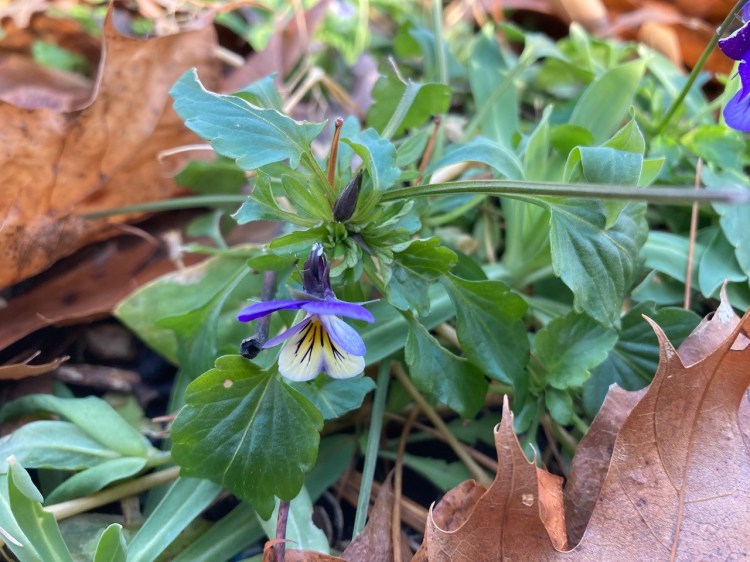When beautiful things worry me rather than bring joy, it makes me think that I have taken a wrong turn in my life.
On Dec. 7 I was out in our vegetable garden harvesting a wonderful crop of leeks and some lettuce. Yes, most of the lettuce was in a cold frame, but about three plants had escaped the mini-greenhouse and nonetheless were healthy, crisp and ready to be added to our lunchtime sandwiches.

Lettuce that’s escaped the cold frame in Tom Atwell’s garden. Though it was Dec. 7, by which time the cold should have killed it, the lettuce was doing just fine. Photo by Tom Atwell
On the way back to the house in a section of the vegetable garden we’d left empty this summer except for self-seeded poppies and wildflowers, dozens of blossoming Johnny-jump-up violas were poking above the fallen oak leaves. Johnny-jump-ups are related to pansies, smaller but easier to care for, and are native to this region as well as to parts of Europe. While generally thought of as spring boomers, because the flowers are most prolific then, they will produce some blossoms throughout the summer and fall.
But December, which TV weathermen keep telling us is winter even though the calendar says winter starts on Dec. 21, is not a time I’d expect any outdoor plant to blossom. I have seen bees on warm days flying around a neighbor’s hive, so bees could pollinate the flowers, but I doubt the seeds that could develop from that pollination would have time to mature.
While the lettuce, leeks and violas are all cold-hardy plants, it’s still a surprise to see them thriving in December.
In another sign of the warm weather, I had to read instructions on digging up dahlias bulbs this year. I’d always done it a week after the first frost, but after we hit November without a frost, I checked the Swan Island dahlias website, which said that even if you haven’t had a frost, you can dig your dahlias on Nov. 15. We did have a frost by Nov. 15, but not a week before that date.
Having a productive and attractive garden in December is enjoyable, but it comes with foreboding. Climate has been big news for the past year, right up there with politics, international saber rattling, racial tensions and murder trials. One recent climate-related disaster has been the massive December tornado season. Earlier in the year there were floods, forest fires, drought and the shrinking of Lake Mead and Lake Powell along the Colorado River, endangering the water supply for much of the western United States.
All of that dampens the joy I feel when I spot our late-blooming flowers.
On the positive side, the damage I experience personally from climate change over the remaining two decades or so I can expect to live is likely to be minimal. While I live in a coastal community, our property probably won’t be damaged by flooding. The place where storm evacuees go in our town is downhill from our house.
While Maine has experienced recent droughts, ours are mild compared to the droughts out West. We have occasional wildfires, but they have been comparatively small for the last 70 years. Still, I care about people who will continue to inhabit the planet after my expected death, and not only my direct descendants. Future generations should have a quality of life at least as good as ours, if not better.

Common periwinkle cheerfully blooming in food editor Peggy Grodinsky’s garden on Nov. 18. She couldn’t remember it ever blooming so late into the fall before. Photo by Peggy Grodinsky
Enough depression. The week from Christmas to New Year should be a happy time. Most students, from kindergarteners through college kids, have time off. Families are together.
So, enjoy the family but think of the future. You can do things in your plot of land to make a tiny difference. You can’t change the entire world, but you can change your world. Start by adding more plants, especially trees and shrubs. Don’t till up pastureland, but leave its roots in place. Those actions allow for carbon sequestration, trapping carbon in growing plants instead of releasing it to the atmosphere as carbon dioxide.
Compost more. Buy less of everything, but especially things made of or wrapped in plastic. Quit using gasoline-powered tools. Get rid of your leaf blower. Travel less.
And try to enjoy. Yes, this season’s late-blooming flowers may be caused by global climate changes that are problematic. But the flowers themselves aren’t the problem, and they are beautiful.
Tom Atwell is a freelance writer gardening in Cape Elizabeth. He can be contacted at: tomatwell@me.com.
Send questions/comments to the editors.


